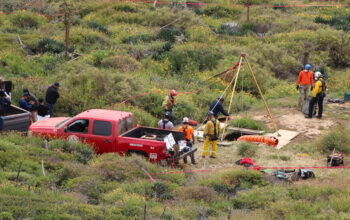
Charles Lister, the director of the Syria and Countering Terrorism and Extremism programs at the Middle East Institute in Washington, said that the targeted American retaliatory strikes were important but unlikely enough to deter Iran’s behavior or the actions of its proxies.
“Until Iran senses that such attacks reap unsustainable consequences, they will continue,” Mr. Lister said in an email. “That presents President Biden with a political question: Is he willing to push back more determinedly to assert a deterrent effect, or are we willing to allow these repeated attacks on U.S. forces?”
The Islamic Revolutionary Guards Corps is a powerful branch of Iran’s armed forces that operates in parallel with the military. It is charged with securing Iran’s borders, and its overseas arm, the Quds Force, carries out operations across the Middle East and beyond, and trains and arms Shiite proxy militias that operate in a number of countries. The U.S. has designated it a terrorist group.
Iran has built increasingly sophisticated weapons-capable drones in recent years. It has both sold them commercially to other nations, including to Russia for use in the war in Ukraine, and stepped up their transfer to proxy groups.
The drones are part of a rapidly evolving threat from Iranian proxies in Syria, with militia forces specialized in operating more sophisticated weaponry hitting some of the most sensitive American targets in attacks that evaded U.S. defenses.
Two of the wounded U.S. service members were treated on site, while the three other service members and the contractor were medically evacuated to coalition medical facilities in Iraq. The Pentagon did not identify the contractor who was killed, pending notification of family, a senior military official said.
America still has more than 900 troops, and hundreds more contractors, in Syria, working with Kurdish fighters to make sure there is no resurgence of the Islamic State, which was ostensibly defeated as a self-declared caliphate in 2019, after five years of wreaking havoc across Iraq and Syria.


